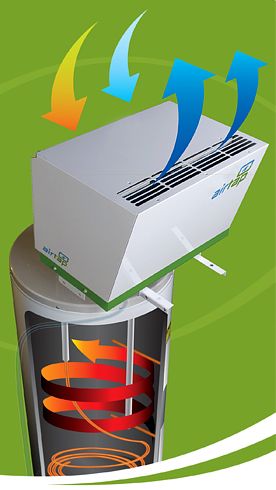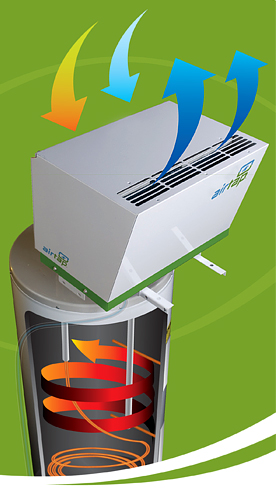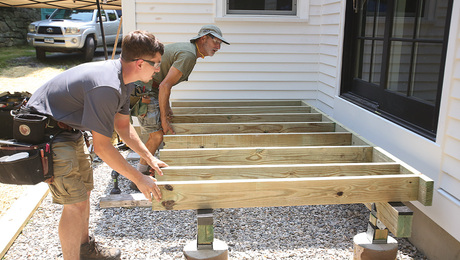Get FREE hot water, AC, and dry air

You want payback? Look into getting an AirTap water heater (www.airgenerate.com). It’s an air-source heat pump unit that mounts on top of your existing water heater.
First, let me say that this is not an article, this is a blog. I haven’t spent months researching the things that I’m about to share with you. But I did learn about AirTap at West Coast Green (www.westcoastgreen.com) a couple of years ago when I did a video for our Web site.
Why am I telling you about it? This gizmo got Alex Wilson’s attention when it appeared at that show. That’s a hard thing to do. The guy sees a lot of schlock that’s so-called “energy efficient.” But Alex gave this product the thumbs up. And more recently, one of our new contributors, Georg Efird, gave high praise to the AirTap, too. Georg owns A2Z Plumbing in Asheville, N.C. (http://www.eatsleepplumb.com/), which specializes in sustainable practices. So when he tells me something’s energy-efficient and sustainable, I listen.
If you have an electric water heater, you can disconnect the heating elements because you won’t need them. And if your water heater is gas-fired, you can shut off the gas supply. This module will heat water more efficiently than your old gas or electric water heater.
How does it work? A compressor in the unit extracts heat from the surrounding air and uses it to heat the water. The compressor runs on electricity, but according to the manufacturer’s Web site, it only uses a very small amount of electricity. So technically speaking, the heat is free—in a manner of speaking.
Not only that, it will produce as much usable cool air as a small window-mounted AC unit. Once the unit extracts the heat from the air, it distributes cooled air, which can be ducted into a floor register. Because it’s replacing warm air with cool air, it acts as a dehumidifier as well.
Fine Homebuilding Recommended Products
Fine Homebuilding receives a commission for items purchased through links on this site, including Amazon Associates and other affiliate advertising programs.

8067 All-Weather Flashing Tape

Handy Heat Gun

Affordable IR Camera

Airgenerate's AirTap uses heat that's in the air to heat water.























View Comments
I'm disappointed. Sure, "this is a blog, not an article" but you could make it sound a little less like an advertisement. Where's the review? In your own words, this thing's been on the market a few years. Quoting manufacturer's claims is fine for that first look at the trade show, but to get such a glowing mention this many years later, you better have done some fact-checking.
I predict that over the next 10 years standard electric resistance hot water heaters will vanish from the marketplace. Air source heat pump water heaters are where the market is headed and we will see several factors driving the change. Electric utilities will provide incentives for homeowners to change-out resistance models for heat pump models. The federal government will increase efficiency requirements that resistance water heaters will be unable to meet. State energy offices will get into the act at some incentive level too. And as more manufacturers introduce more models, the price will come down.
Air Tap is a retrofit for existing water heaters. They are usually sold through installing dealers but you can buy one online for about $750. Anyone handy with basic tools and electric wiring can convert their electric or gas water heater. The Air Tap inserts a heat exchanger through the dip tube. Other companies (Trevor-Martin, North Road) make similar retrofit heat pumps.
If you're in the market for a new water heater I recommend looking into a fully integrated heat pump water heater rather than the AirTap retrofit. A GE model will be the first large US maker to offer a model. It will be out in November and will cost $1200 or so. Expect several other companies to offer heat pump water heaters soon.
$1200 sounds expensive when you figure a new resistance model of the same capacity is about $400. But unlike the payback-guesstimates for insulation upgrades, it's easy to calculate payback period for heat pump water heaters. The new heat pump models cut electric consumption by at least half. The average electric hot water heater uses $600/year (5000 kwh). So you save $300 a year in operational cost. The new heat pump water heater pays for itself in less than 3 years.
A handy person can also turn one of these heat pump water heaters into a dehumidifier and air conditioner. The 'exhaust' air from the heat pump is cold air. Simple duct work can deliver that air where you want it. So just like your refrigerator helps warm your house in the winter, your water heater can cool it in the summer.
So what's next on the horizon? The water heater / refrigerator combination unit. Both operate on the same technology (refrigeration cycle). The heat extracted from the refrigerator warms the water. Nothing goes to 'waste' any season of the year. I'm sure there are companies out there working on models.
For more information:
US DOE Research: http://www.ornl.gov/sci/btc/apps/hotwater.html
North Road Technologies http://www.northrdt.com/
Trevor-Martin: http://trevormartin.com/hwg_main.asp
GE: http://www.geappliances.com/products/water/heat-pump-water-heater
Saiboogu
Sorry you're disappointed. Saying that Alex Wilson and Georg Efird both recommend the AirTap was meant to back up the facts I menioned.
And thanks for your input, Mike.
A few important facts are missing from this advertisement:
1) In this application, pumping heat uses less electrical energy than electric resistance heating but is it FREE - not by a long shot. It's just a little cheaper.
2) The entire discussion falls apart when you apply it to predominantly heating climates. During heating season, you are pumping heat out of air you just paid to heat and you are using electricity to do it. So it will actually cost and use more energy to heat your water than if you used electric resistance alone.
3) How long to bring a tank of water up to temp? This unit kicks out less than 1/4 of the BTU's per hour than a typical hot water tank for a small family.
Still, this is an innovative product and can save energy if used in the right environment. I commend them for that. The application is for someone with low hot water needs living in an air conditioning climate. In that case maybe solar would be a better bet?
CG
CPG001 took the words right out of my mouth. Here in NW Washington state, we seldom are using air conditioning. The heat taken from the air would trigger my heating system to cycle back on!!
We're using solar heat collectors on our roof to heat our domestic hot water. Certainly not cheap, but much more direct, and is the only investment in our new house that actually pays me back something (vs just minimizing losses, as in good insulation, energy efficient windows, etc.)
"So technically speaking, the heat is free—in a manner of speaking."
And that manner of speaking is– LYING!
Half price is not free. Eventual payback is not the same as free. Saving money over the long run is not the same as free. It's curious that the maker of a reliable product would choose promotional copy that groups them with snake oil salesman and internet scams. Disconnect the heating elements/turn off the gas on your water heater? A family of four is going to be taking a lot of cold showers.
I have to disagree with Mike Guertin (whom I greatly respect) on one point. Calculating the payback on this type of heatpump is not simple and easy. For any heatpump, you have to know the average temperatures on the input and output sides. The average temperature on the input side will vary with house temperature, and as others have mentioned, if you are paying to heat your house, calculating the relative advantage/disadvantage of running an indoor air source heat pump is challenging. The average temperature on the output side will vary with the amount of water flow, which will vary for each family.
You also have to compare the relative average longevity and maintenance schedules. I'm betting a high tech device like a heat pump will have a shorter life span. Maybe Mike covers these bases by saying that this kind of device will decrease energy consumption "by at least half." But verifying that for a given house and family in a given location would not be easy.
This kind of product seems to offer great potential, but lying about its capabilities and functions, as the company does, is a disservice to potential customers.
Interesting little snippet.
I like reading about new ways of looking at things, making better use of the things we already have.
Thanks for posting.
Shawn
OK fellas. . .the heating is FREE. I saw this post from another discussion about the airtap. the post is below. . .
AIRTAP WATER HEATING:
AirTap Heat Pump Water Heater is installed in the places like garage, basement, attic which are mostly not directly heated by conventional sources of energy. The heat comes from the heat loss from the walls and roofs of the living space and from the nearby furnace. The heat draw for AirTap from air is about 5000 BTU per hour for average 4 hours a day which comes from the lost heat from walls and roof.
Following is the calculation of the heat loss to the basement from the living space.
I found the reference data about heat loss from:
http://umt.edu/geosciences/faculty/sheriff/Sheriff_Vita_abstracts/Basement%20Insulation%20Energy%20Savings.htm
Heat losses:
BTU/hour = Area (ft2) * (T1 - T2)(oF) / R (hour*oF*ft2/BTU)
Assumptions:
- 6" thick with R value of 0.08/inch
- Area: 15'x15' = 225 (ft2.)
- Temperates: T1, in living space=76(oF) and T2, in basement = 45(oF)
Heat Given to basement from living space = 225(ft2) * (76 - 45)(oF) / (0.08/inch * 6") (hour*oF*ft2/BTU)
= 14,531 BTU /hour
It is evident that even smaller basement of 15'x15' would provide enough heat for AirTap Heat Pump Water Heater to heat the water at about 200% efficiency. AirTap would take roughly 5000BTU from Air and 2000 BTU from electricity to give 7000BTU of heating. This is in line with our customers' experience during winter season.
If the water heater is in the room which is directly heated by electric heat, we don't recommend using AirTap heat pump water heater. However, we have not come across any homeowner who was heating his water heater room with electrical heat.
Generally basement, garage or attic is isolated from the heated living spaces. We recommend ducting out the cooled air from the enclosed space during winter season and enjoy free cooled air during summer using our AirVent. The same is true for AirTap installed in a closet.
Many of our customers in colder places have realized the free dehumidification of basement from AirTap while reaping the benefit of more than 50% energy saving in water heating.
Heating water = cooling air Posted by Ethan Goldman on Jul 1, 2008, 11:37 AM
Because this is an air-source heat pump, the heat it's "pushing" into the water in the tank is extracted from the air. Their web site mentions that you can use the cool, dry air during summer months. However, during the winter this could increase the heating load if the AirTap is installed in a conditioned space, or in a basement that is not well-isolated from conditioned spaces.
If the heat pump used the home's drain-water as a heat source instead, this problem would be avoided. As an added benefit, the efficiency of the heater would be much higher, as the source temperature would be higher. However, I suspect they avoided this configuration to simplify retrofits. There would also be some control logic issues, for example if the tank temperature dropped during a period of disuse and the drain-water was not running.
Up here in Canada you wouldn't think heat pumps would be considered but we use one to heat out 3000 sq.ft. home here in the lower mainland of British Columbia. Overall, the cost of gas and electricity are half of what they used to be. Now I am going to install an AirTap on the hot water tank. To make use of some free heat our hot water tank sits in a closet that backs on to our walk in pantry next to the kitchen. The pantry is fully insullated. Our kitchen fridge is built in with the back of it next to the west wall of hot water closet and there is chest freezer in the pantry that backs the south wall of the hot water closet. We are going to vent the warm air off the fridge and freezer into the bottom of the hot water closet and as the warm air rises the Airtap will make use of it to heat our hot water. The cool dry air from the AirTap heatpump will get vented back in at the top of my insulated pantry keeping it cool and dry. I know nothing is for free but my wife and I are "do it yourselfers" and we don't mind investing our sweat equity in our home and if the utility bill keeps going down, so much the better.